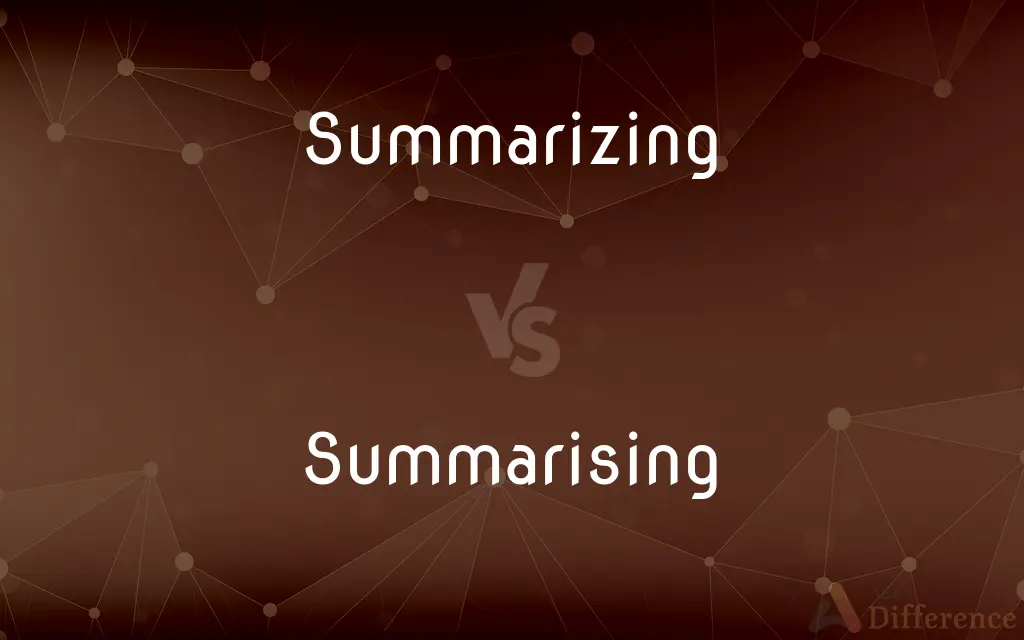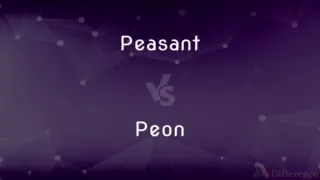Summarizing vs. Summarising — What's the Difference?
By Tayyaba Rehman — Published on October 2, 2023
Summarizing is the American spelling, meaning to condense information to the main points. Summarising is the British spelling, with the same meaning.

Difference Between Summarizing and Summarising
Table of Contents
ADVERTISEMENT
Key Differences
Summarizing and Summarising are two variants of the same word, depicting a method to present information concisely. Summarizing is primarily used in American English, while Summarising is preferred in British English. Both words reflect the action of reducing extensive content to its essential elements or main points.
In writing, Summarizing is often employed to give readers a quick overview of the discussed material, while Summarising serves the identical purpose in regions using British English conventions. Both words are crucial in processing and relaying voluminous information in a clear, succinct manner, aiding understanding and retention.
The utilization of Summarizing and Summarising extends beyond literature and can be found in everyday communication. Summarizing enables speakers to convey the gist of information swiftly and efficiently, while Summarising achieves the same objective in conversations following British English norms.
Although Summarizing and Summarising have identical meanings, their usage depends on the regional linguistic preference. Summarizing is recognized and used in American publications and discourse, whereas Summarising is standard in British contexts.
Comparison Chart
Spelling
Uses ‘z’
Uses ‘s’
ADVERTISEMENT
English Variant
American English
British English
Usage
Preferred in American publications and discourse
Standard in British contexts
Pronunciation
/ˈsʌməˌraɪzɪŋ/
/ˈsʌməraɪzɪŋ/ (similar but with British accent)
Function
Condensing extensive content to essential points
Condensing extensive content to essential points
Compare with Definitions
Summarizing
Condensing information to main points.
He is summarizing the report to present the key findings.
Summarising
Reducing comprehensive information to essentials.
Summarising the findings, he brought attention to the significant results.
Summarizing
Giving a brief overview of content.
Summarizing the article allowed us to understand the main argument quickly.
Summarising
Representing the essence of voluminous information.
Summarising the lengthy document saved a lot of reading time.
Summarizing
Providing a succinct account of information.
Summarizing the data, we identified the prevailing trends.
Summarising
Delivering a brief rendition of extensive details.
She is summarising the event, highlighting the main occurrences.
Summarizing
Reducing detailed information to essentials.
Summarizing the research study, he highlighted the crucial outcomes.
Summarising
Condensing extensive details to core points.
He is summarising the main ideas of the book succinctly.
Summarizing
Presenting the gist of extensive information.
She is summarizing the book's plot during the discussion.
Summarising
Offering a concise overview of content.
By summarising the text, she provided a quick insight into the subject matter.
Summarizing
To make a summary or make a summary of.
Summarising
Present participle of summarise
Summarizing
Present participle of summarize
Common Curiosities
Is there a difference in meaning between Summarizing and Summarising?
No, they have the same meaning but different spellings based on the regional variant of English.
Which one is American English, Summarizing or Summarising?
Summarizing is American English.
Is Summarising acceptable in American publications?
Summarising might be corrected to Summarizing in strictly American publications due to regional spelling preferences.
Which regions primarily use Summarising?
Summarising is primarily used in regions following British English conventions.
Can Summarizing be used in academic writing?
Yes, Summarizing is widely used in American academic writing to condense information.
How is Summarising pronounced?
Summarising is pronounced similarly, /ˈsʌməraɪzɪŋ/, but with a British accent.
Can the words Summarizing and Summarising be used interchangeably?
Yes, but it is important to maintain consistency in spelling within a piece of writing or publication.
How is Summarizing pronounced?
Summarizing is pronounced as /ˈsʌməˌraɪzɪŋ/.
Is Summarizing used in oral communication?
Yes, Summarizing is often used in speech to convey main points quickly.
Is Summarising a formal writing technique?
Yes, Summarising is a formal technique used to condense information in British English writing.
Share Your Discovery

Previous Comparison
Persuasion vs. Manipulation
Next Comparison
Peasant vs. PeonAuthor Spotlight
Written by
Tayyaba RehmanTayyaba Rehman is a distinguished writer, currently serving as a primary contributor to askdifference.com. As a researcher in semantics and etymology, Tayyaba's passion for the complexity of languages and their distinctions has found a perfect home on the platform. Tayyaba delves into the intricacies of language, distinguishing between commonly confused words and phrases, thereby providing clarity for readers worldwide.
















































